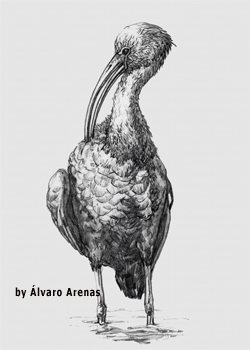Immigration and local recruitment play a central role in determining the growth rate of breeding populations. Unravelling these processes in newly-established populations is of great importance to increase understanding of how species change their distributions in response to global change. In this study, these processes were analyzed through the monitoring of a glossy ibis population in Doñana from the settlement of the colony in 1996. The impressive growth of this population due to immigration (from 7 couples to over 8,000 in twenty years) has directly fueled the expansion of the species in the Mediterranean area and Western Europe. In terms of metapopulation, the Doñana population has rapidly changed its status from sink to source population, thanks mainly to immigration. The pull factors in Donana must have been very significant considering the high values of local demographic parameters such as reproductive success (average of 2.1 fledglings per pair) and the rate of self-recruitment which was particularly high (>80%) for first-year individuals. Finally, this study highlights as immigration not only support populations at the limit of its range, but may also indirectly play a key role in the expansion process of a species. informacion[at]ebd.csic.es: Santoro et al (2016) Immigration enhances fast growth of a newly-established source population. Ecology doi:10.1890/14-2462
http://onlinelibrary.wiley.com/doi/10.1890/14-2462/full  Latest News
Latest News
 Las altas temperaturas están provocando que las lagunas y las marismas de Doñana pierdan agua rápidamente
Las altas temperaturas están provocando que las lagunas y las marismas de Doñana pierdan agua rápidamente
La superficie inundada en la marisma es de un 78% pero la profundidad es escasa. Por otra parte, sólo el 1,9% de las lagunas temporales están inundadas. Las precipitaciones crean una oportunidad...
 Traffic noise causes lifelong harm to baby birds
Traffic noise causes lifelong harm to baby birds
A study with CSIC participation reveals for the first time that car noise harms individuals throughout their lifetime even years after exposure
 Illegal wildlife trade, a serious problem for biodiversity and human health
Illegal wildlife trade, a serious problem for biodiversity and human health
A research team led by the Doñana BIological Station and the University Pablo de Olavide have detected wild-caught pets in 95% of the localities in the Neotropic and warns of the risk of zoonotic...
 Urbanization and loss of woody vegetation are changing key traits of arthropod communities
Urbanization and loss of woody vegetation are changing key traits of arthropod communities
Urbanization is favouring smaller beetle species and larger spider species with greater dispersal capacity.
The loss of woody areas is linked to a decline in the duration of the activity...
The loss of woody areas is linked to a decline in the duration of the activity...
 Blood lead levels in an endangered vulture species decreased following restrictions on hunting practices
Blood lead levels in an endangered vulture species decreased following restrictions on hunting practices
Canarian Egyptian vulture was on the verge of extinction at the end of the 20th century. At that time, studies revealed that lead poisoning was a serious problem for the population’s survival. The...
— 5 Items per Page
 Asset Publisher
Asset Publisher
Back






